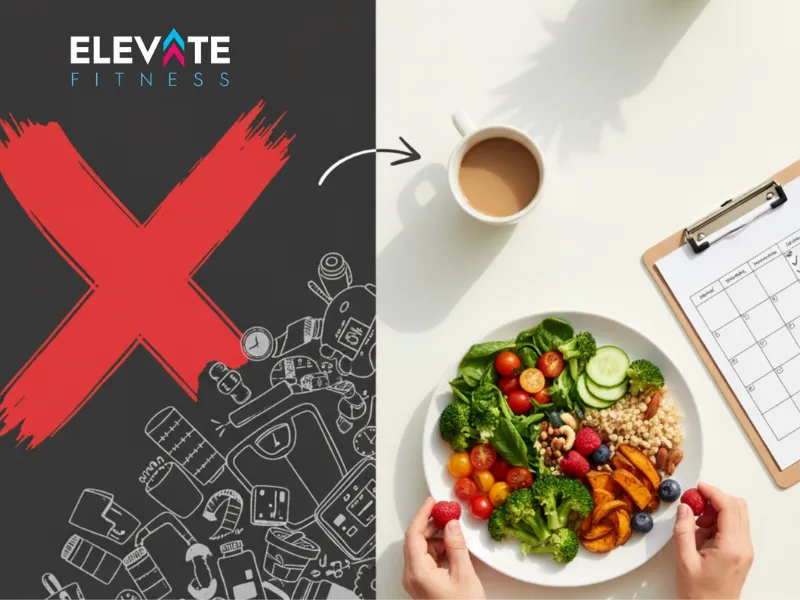
Certified Fitness Trainer Explains | Diets Have to End — But Not Without a Plan
The average person cycles through multiple “diets” in their lifetime, usually ending up in the same frustrating loop: restriction → rebound → defeat. But here’s the truth — a diet isn’t supposed to mean restriction. At its root, the word diet simply means “the way you eat.” Your daily meals. Your patterns. Your food culture.
When we define “diet” only as weight loss, we miss the bigger picture: finding a sustainable eating style that supports your health and lifestyle long term.
Diets Provide Structure — But They Aren’t Built to Last
Most mainstream diets are designed as short-term systems. They create structure through calorie limits, strict food lists, and rigid rules. That structure can be helpful temporarily — it reduces decision fatigue and gives a sense of direction.
But the real problem comes when the diet ends.
When people “finish” dieting, whether from success or burnout, they often fall right back into old eating patterns. Hunger feels stronger, energy crashes, and convenience eating returns.
This isn’t a failure of willpower.
It’s a failure of structure — because diets rarely teach what to do next.
The Transition Problem Most People Ignore
Your body doesn’t understand the concept of “I was just dieting for a bit.” It only knows that energy was restricted.
During a diet:
Leptin drops → your hunger increases
Ghrelin rises → cravings intensify
Metabolism slows down → you burn fewer calories
So when people try to “eat normally again” or jump straight into intuitive eating, the signals are still disrupted. Appetite is elevated, satiation is delayed, and without a gradual transition, weight regain becomes extremely likely.
What’s missing is not another round of dieting.
What’s missing is a maintenance framework.
What Should Replace the Diet
Ending a diet shouldn’t mean the end of structure — it should mark the beginning of a sustainable way of eating built around real life.
Here’s what that looks like:
• Caloric recalibration based on your current body, goals, and activity level
• Habit continuity like regular meal prep, high-protein meals, and daily movement — without the pressure of restriction
• New markers of success such as strength, energy, sleep, digestion, or consistency
• Mindset reframing from “What am I allowed to eat?” to “What fuels my lifestyle best?”
• Expectation management so you understand that small weight fluctuations are normal
This isn’t about finding a new rigid diet. It’s about creating your diet — your own long-term, sustainable pattern of eating.
Why a Plan Matters More Than a Goal
Anyone can set a weight-loss goal.
But without a plan after the goal, even the most disciplined efforts unravel.
A long-term plan teaches you:
How to maintain results
How to build meals that work for your body
How to measure progress beyond the scale
How to eat in a way you actually enjoy
You don’t need to “be on a diet” forever — in fact, you shouldn’t. The goal is to stop dieting and start building an eating style you can sustain for life. When you move from temporary restriction to lasting structure, you break the diet cycle for good and finally build a way of eating that supports your health, performance, and real-life demands.
Ready to Leave the Diet Rollercoaster Behind?
At Elevate Fitness in Dallas, Texas, we combine expert coaching with sustainable nutrition strategies so you can stop dieting and start thriving. Our Certified Personal Trainers help you build strength, confidence, and habits that last far beyond any 30-day plan.
Looking for the best personal trainers in Dallas to help you transform your nutrition and fitness?
👉 Schedule your complimentary No Sweat Intro
or call (214) 302-9788 to get started.
